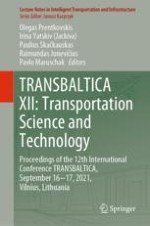2022 | OriginalPaper | Chapter
Station Capacity Analysis of a Metro Line with Discrete Event Simulation
Authors : Mehmet Sinan Yıldırım, Metin Mutlu Aydın
Published in: TRANSBALTICA XII: Transportation Science and Technology
Publisher: Springer International Publishing
Activate our intelligent search to find suitable subject content or patents.
Select sections of text to find matching patents with Artificial Intelligence. powered by
Select sections of text to find additional relevant content using AI-assisted search. powered by
